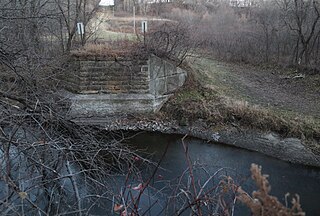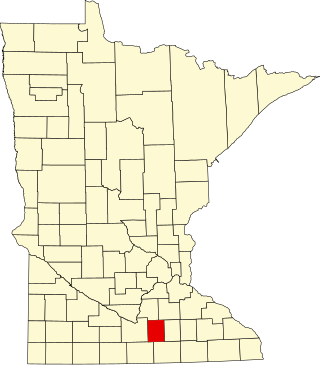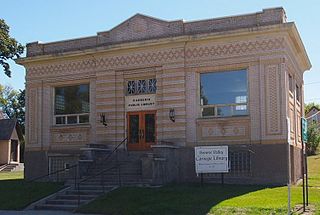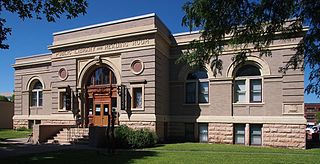
Waseca County is a county in the U.S. state of Minnesota. As of the 2020 census, the population was 18,968. Its county seat is Waseca.

The Cobb River and its tributary the Little Cobb River are small rivers in southern Minnesota in the United States. The Cobb River is a 78.6-mile-long (126.5 km) tributary of the Le Sueur River. Via the Le Sueur, Blue Earth and Minnesota rivers, it is part of the watershed of the Mississippi River.

This is a list of sites in Minnesota which are included in the National Register of Historic Places. There are more than 1,700 properties and historic districts listed on the NRHP; each of Minnesota's 87 counties has at least 2 listings. Twenty-two sites are also National Historic Landmarks.

Claude and Starck was an architectural firm in Madison, Wisconsin, at the turn of the twentieth century. The firm was a partnership of Louis W. Claude (1868–1951) and Edward F. Starck (1868–1947). Starck apprenticed with Edward Townsend Mix in Milwaukee. Established in 1896, the firm dissolved in 1928. The firm designed over 175 buildings in Madison.
The Traverse des Sioux Library System (TdS) is a regional public library system in south-central Minnesota, founded in 1975. Mankato is the seat of the library administration.

The Aitkin Carnegie Library is a Carnegie library in Aitkin, Minnesota, United States. It was designed by architects Claude & Starck and was built in the Classical Revival style. It was listed on the National Register of Historic Places in 1982.

The Waseca County Courthouse is the seat of government for Waseca County in Waseca, Minnesota, United States. The 1897 Richardsonian Romanesque building was listed on the National Register of Historic Places in 1982 for its state-level significance in the themes of architecture and politics/government. It was nominated for being the home of the county's government and for the role that achieving county seat status had on the development of the city.

This is a list of the National Register of Historic Places listings in Le Sueur County, Minnesota. It is intended to be a complete list of the properties and districts on the National Register of Historic Places in Le Sueur County, Minnesota, United States. The locations of National Register properties and districts for which the latitude and longitude coordinates are included below, may be seen in an online map.
Janesville Public Library may refer to:

This is a list of the National Register of Historic Places listings in Waseca County, Minnesota. It is intended to be a complete list of the properties and districts on the National Register of Historic Places in Waseca County, Minnesota, United States. The locations of National Register properties and districts for which the latitude and longitude coordinates are included below, may be seen in an online map.

The historic Duluth Public Library is a former Carnegie library building at 101 West Second Street in Duluth, Minnesota, United States. It was constructed in 1902 as the first purpose-built facility of the Duluth Public Library. It was listed on the National Register of Historic Places in 1978 for its local significance in the themes of architecture and education. It was nominated for its Neoclassical architecture and association with early community education efforts.
Alma City is an unincorporated community in Waseca County, Minnesota, United States, south of Janesville.

Glenwood Public Library is the public library serving the city and surrounding area of Glenwood, Minnesota, United States. The original wing of the building was constructed in 1908 as a Carnegie library and was listed on the National Register of Historic Places in 1982 for its local significance in architecture and education. It was nominated to the National Register for being one of Pope County's most architecturally distinctive buildings and its only representative of the Carnegie library phenomenon.

The Browns Valley Carnegie Library is a Carnegie library building in Browns Valley, Minnesota, United States, completed in 1916. It was listed on the National Register of Historic Places in 1985 as the Browns Valley Carnegie Public Library for having local significance in the themes of architecture and education. It was nominated for being the town's most architecturally significant early-20th-century building and an example of the libraries provided to small Minnesota communities by Andrew Carnegie's philanthropy.

The William R. Wolf House is a historic house in Waseca, Minnesota, United States. It was built around 1895 and served as the family residence of a prominent local merchant and civic leader. It was listed on the National Register of Historic Places in 1982 for its local significance in the theme of architecture and commerce. It was nominated for being Waseca's leading example of the larger residences erected by its prosperous merchant class and of Queen Anne architecture.

The Roscoe P. Ward House is a historic house in Waseca, Minnesota, United States. It was built from 1896 to 1897 and served as the family residence of a local leader in politics and finance. It was listed on the National Register of Historic Places in 1982 for its local significance in the theme of architecture, commerce, and politics/government. It was nominated for being Waseca's most prominent large residence and a manifestation of its commercial and industrial activity around the turn of the 20th century.

The John W. Aughenbaugh House is a historic house in Waseca, Minnesota, United States. It was built in 1897 and served as the family residence of a prominent local miller. It was listed on the National Register of Historic Places in 1982 for its local significance in the themes of architecture and industry. It was nominated for being Waseca's most prominent residence associated with the local milling industry.

Hofmann Apiaries is a historic former apiary in Janesville, Minnesota, United States. It was established in 1907 as owner Emil Hofmann began developing beekeeping facilities on his existing farm. It was listed on the National Register of Historic Places in 2016 for its state-level significance in the theme of agriculture. The listing consists of 10 contributing properties, including the 1884 farmhouse and nine beekeeping facilities built 1907–1933. Hofmann Apiaries was nominated for achieving regional and national prominence in beekeeping for its innovative and influential practices.

The Morris Carnegie Library is a former library building in Morris, Minnesota, United States, now occupied by a historical society. It was built in 1905 as one of the 2,500 Carnegie libraries funded by steel magnate Andrew Carnegie. It was listed on the National Register of Historic Places in 1983 for having local significance in the themes of architecture and education. It was nominated for being a longstanding focus of education in Morris, with locally distinctive and well preserved Neoclassical architecture.

The Mankato Public Library and Reading Room is a former library building in Mankato, Minnesota, United States. It was built as a Carnegie library from 1902 to 1903 and housed Mankato's public library until 1977. The building was listed on the National Register of Historic Places in 1980 for its local significance in the themes of architecture and education. It was nominated for its association with the Carnegie library phenomenon and for its Renaissance Revival architecture using local materials.





















